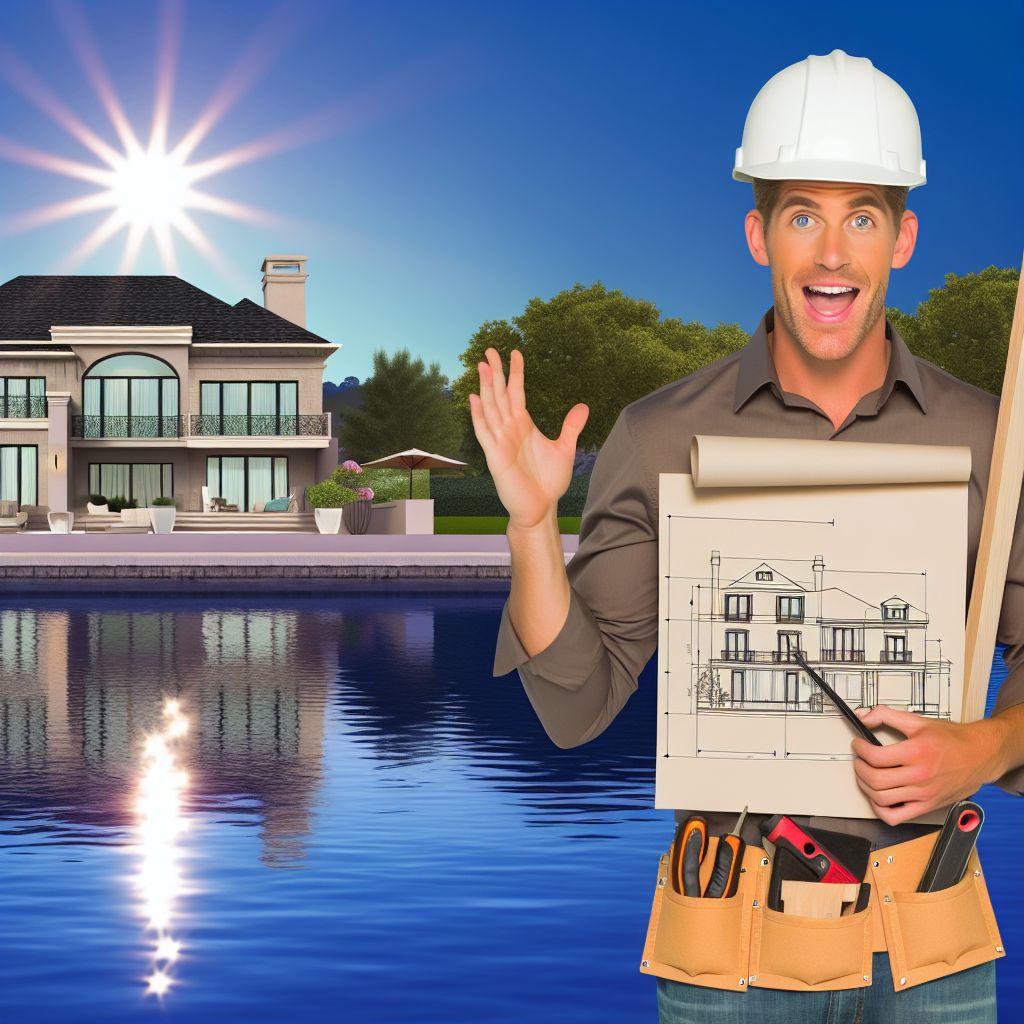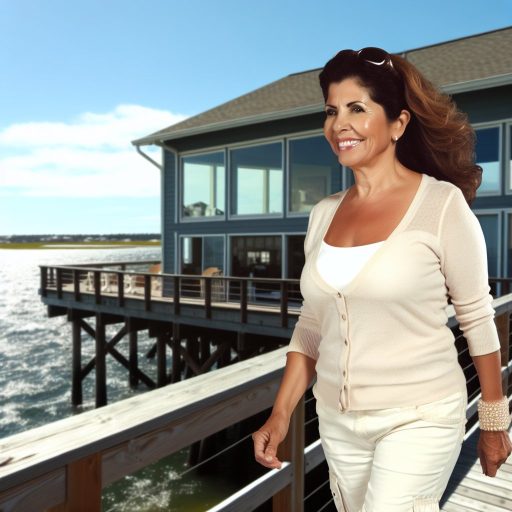Assessing the Current Condition of the Waterfront Property
Conducting a Thorough Inspection
Begin by inspecting the exterior of the property.
Look for signs of erosion near the waterfront.
Assess the condition of retaining walls and docks.
Next, examine the roofing and siding for any damage.
Don’t forget to check windows and doors.
These elements play a critical role in weather resistance.
Evaluating Structural Integrity
Focus on the foundation when assessing structural integrity.
Check for cracks, shifting, or water damage.
Evaluate beams and support structures for signs of wear.
Additionally, consider hiring a structural engineer for a detailed analysis.
This will help identify potential long-term issues.
Checking Systems and Utilities
Inspect heating, ventilation, and air conditioning systems.
Ensure plumbing and electrical systems are up to code.
Look for any signs of leaks or outdated materials.
Upgrading outdated systems can enhance efficiency and prevent issues.
Make a note of any repairs needed in this area.
Environmental Considerations
Evaluate the impact of weather patterns on your property.
Flood zones may require specific planning measures.
Assess vegetation near the waterfront for invasive species.
Consider consulting an environmental specialist for guidance.
This can help ensure compliance with local regulations.
Documenting Findings
Keep a record of all findings during your assessment.
Photograph areas of concern for reference.
This documentation will help during the planning phase.
It also provides valuable information for contractors.
Thorough documentation can save time and costs down the line.
Understanding Local Regulations and Permits for Renovations
Importance of Understanding Local Regulations
Understanding local regulations is essential for any waterfront renovation project.
These rules help protect waterfront environments and communities.
Complying with regulations also avoids potential legal issues.
Identifying Relevant Regulations
Each municipality often has different regulations regarding renovations.
Begin by checking with your local planning department.
Establish a list of regulations that may affect your project.
Common regulations include zoning laws, building codes, and environmental protections.
Obtaining Necessary Permits
Before starting renovations, ensure you obtain all necessary permits.
Permits verify that your project complies with local rules.
This process usually involves submitting plans for approval.
Failure to secure permits can lead to costly fines or project delays.
Working with Professionals
Hiring professionals can simplify the permitting process significantly.
Architects and contractors often understand local regulations well.
They can guide you through the documentation and approval stages.
Consider consulting a legal expert for complicated projects.
Staying Informed and Updated
Local regulations may change; staying informed is crucial.
Subscribe to local government newsletters to receive updates.
Attend community meetings to learn about upcoming changes.
Networking with other homeowners can also provide insights.
Being proactive helps ensure your renovation stays compliant.
Choosing Waterproof and Weather-Resistant Materials
Understanding the Benefits
Waterfront properties face unique challenges from the environment.
The right materials protect your investment and enhance comfort.
Choosing durable options can prevent costly repairs in the future.
Weather-resistant materials withstand harsh climates and salt exposure.
They also help maintain the aesthetic of your luxury home.
Essential Materials to Consider
- Composite decking offers long-lasting performance.
- Fiberglass windows resist corrosion and energy loss.
- Stone and brick provide natural durability against moisture.
- High-quality roofing materials protect against wind and rain.
Assessing Material Performance
Review the manufacturer’s guidelines for each material.
Inspect products for certifications on water resistance.
Research customer testimonials to ensure satisfaction.
Consult professionals for recommendations and insights.
Designing with Durability in Mind
Incorporate architectural features to enhance resilience.
Design overhangs and awnings to protect walls and windows.
Consider drainage solutions to direct water away from your home.
These strategies help reduce maintenance and extend product life.
Investing Wisely for Long-Term Value
Budget for high-quality materials despite higher initial costs.
A premium product often pays off in durability and performance.
Evaluate warranties and service agreements before purchase.
Investing in quality now prevents frequent replacements later.
Delve into the Subject: Maximize Rental Potential With Prime Ski-In/Ski-Out Real Estate Investments
Designing Outdoor Spaces for Maximum Scenic Views
Maximizing Sightlines
Consider the placement of furniture for optimal view angles.
Ensure that trees and shrubs do not block important vistas.
Opt for low-profile seating to enhance sightlines.
Use glass railings to maintain unobstructed views.
Arrange outdoor features in harmony with the landscape.
Incorporating Natural Elements
Utilize natural materials in your design to blend with the surroundings.
Use wood, stone, and metal that complement the waterfront setting.
Incorporate native plants to enhance biodiversity and aesthetics.
Choose water features that reflect the natural beauty nearby.
Creating Multi-Functional Spaces
Design areas for relaxation and entertaining to maximize usability.
Integrate shade structures to provide comfort during peak sun hours.
Include outdoor kitchens or fire pits for social gatherings.
Ensure pathways connect different areas while maintaining flow.
Enhancing Comfort and Privacy
Use landscaping to create natural privacy barriers.
Install outdoor drapes or screens for additional seclusion.
Strategically place planters to define spaces without obstructing views.
Consider windbreaks to protect from breezy waterfront conditions.
Utilizing Lighting Effectively
Incorporate ambient lighting to enhance evening experiences.
Use path lights to guide guests safely along walkways.
Highlight architectural features with spotlights for drama at night.
Choose solar-powered lights for eco-friendly illumination.
Find Out More: How to Market Luxury Properties to International Buyers
Energy Efficiency Considerations for Waterfront Homes
Importance of Energy Efficiency
Energy efficiency significantly reduces utility bills.
Additionally, it enhances the overall comfort of your home.
Moreover, energy-efficient upgrades can increase property value.
Choosing the Right Windows and Doors
Opt for high-performance windows to prevent heat loss.
Consider triple-pane glass for superior insulation.
Installing storm doors can also enhance energy efficiency.
Ensure proper sealing around windows and doors to minimize air leaks.
Utilizing Renewable Energy Sources
Installing solar panels harnesses clean energy for your home.
Consider solar water heaters as a cost-effective alternative.
Wind turbines may also be viable for certain waterfront locations.
Insulation Strategies
Invest in high-quality insulation for walls and attics.
Use spray foam insulation for hard-to-reach areas.
Ensure insulation is moisture-resistant to combat humidity.
Energy Efficient Heating and Cooling Systems
Choose HVAC systems rated for energy efficiency.
Regular maintenance ensures optimal performance year-round.
Consider installing smart thermostats to manage energy use.
Water Conservation Techniques
Use low-flow fixtures to reduce water consumption.
Consider rainwater harvesting systems for outdoor use.
Install drip irrigation systems for more efficient landscape watering.
Gain More Insights: Why Ski-In/Ski-Out Homes Are An Enduring Trend In American Luxury Real Estate
Upgrading Dock and Waterfront Access Features
Enhancing Dock Systems
Consider expanding your dock to accommodate larger vessels.
Incorporate durable materials for longevity and resilience.
Composite decking provides a modern and low-maintenance option.
Add built-in storage for boating equipment.
Ensure electrical outlets are easily accessible for convenience.
Improving Safety and Security
Install proper lighting along your dock for enhanced safety.
Secure railings reduce the risk of slips and falls.
Use non-slip surfaces to improve traction in wet conditions.
Consider surveillance cameras to monitor dock activities.
Creating Inviting Waterfront Areas
Design relaxing seating areas around your dock.
Incorporate landscaping features to enhance aesthetics.
Choose native plants for easy maintenance and ecological benefits.
Install fire pits or outdoor heating for year-round enjoyment.
Improving Water Access
Access points should include easy walkways to the water.
Add steps or ramps for convenient entry into the water.
Consider a floating dock for changing water levels.
Evaluate shoreline stabilization options to prevent erosion.
Incorporating Eco-Friendly Practices
Implement rain gardens to manage runoff effectively.
Choose sustainable materials for your upgrades.
Utilize solar lighting to minimize energy consumption.
Consider native plant landscaping to support local wildlife.
Learn More: Discover Prime Mountain Markets For Ski-In/Ski-Out Luxury Homes Nationwide

Incorporating Sustainable Practices into Renovation Plans
Emphasizing Energy Efficiency
Energy efficiency serves as a cornerstone of sustainable renovations.
Start by replacing outdated appliances with Energy Star-rated models.
These appliances consume less energy and reduce utility bills.
Additionally, consider installing energy-efficient windows and doors.
They provide better insulation and decrease heating costs.
Insulation upgrades also play a vital role in energy conservation.
Consider using recyclable materials to enhance the home’s sustainability.
Utilizing Renewable Energy Sources
Renewable energy sources represent a powerful approach to sustainability.
Solar panels can significantly reduce energy dependence.
Wind turbines also serve as an option for waterfront properties.
Consult with local energy providers for tailored solutions.
Incorporating these systems contributes to environmental stewardship.
Water Conservation Techniques
Water conservation remains essential in luxury waterfront homes.
Implement low-flow fixtures in bathrooms and kitchens.
These fixtures reduce water usage without sacrificing performance.
Rainwater harvesting systems can also provide irrigation for landscaping.
Employ drought-resistant plants to minimize water consumption.
Such landscaping choices encourage eco-friendly water management.
Choosing Sustainable Materials
Sustainable materials reflect a commitment to the environment.
Opt for reclaimed wood in construction and design elements.
Recycled glass countertops add both beauty and sustainability.
Additionally, use low-VOC paints and finishes to improve indoor air quality.
These products safeguard the health of inhabitants and the environment.
Smart Home Technology Integration
Smart home technology enhances energy efficiency in renovations.
Install smart thermostats to optimize heating and cooling.
Smart lighting systems allow users to control energy consumption easily.
Use home automation systems to manage resources effectively.
Such technology supports both luxury and sustainability goals.
Community and Local Sourcing
Engaging with local suppliers fosters community and sustainability.
Source materials and labor from the surrounding area whenever possible.
This practice supports local economies and reduces transportation emissions.
Research eco-friendly contractors who align with your renovation goals.
Building relationships with local artisans adds unique charm and character.
Interior Design Trends for Luxury Waterfront Living
Natural Materials
Natural materials enhance the elegance of waterfront homes.
Wood, stone, and bamboo are popular choices for flooring and accents.
Such materials promote a harmonious connection with the surrounding environment.
Additionally, they provide a timeless aesthetic that complements luxury designs.
Maximizing Views
Large windows and open floor plans maximize stunning waterfront views.
Consider installing floor-to-ceiling windows to invite light and nature indoors.
Balconies and terraces expand living spaces while offering outdoor enjoyment.
Choose furniture arrangements that encourage engagement with panoramic scenery.
Light and Bright Interiors
Bright color palettes create a sense of openness and tranquility.
Soft whites, sandy beiges, and ocean-inspired blues enhance the coastal vibe.
Light fixtures should complement these colors while providing ample illumination.
Use mirrors strategically to reflect light and create an illusion of more space.
Coastal-Inspired Decor
Embrace coastal elements through artwork, fabrics, and accessories.
Incorporate nautical themes with subtle references to marine life.
Textiles should include soft linens and durable materials for comfort.
This decor style fosters a relaxed, inviting atmosphere throughout the home.
Technology Integration
Smart home technology enhances convenience in luxury waterfront living.
Automated systems control lighting, climate, and security with ease.
Incorporate audiovisual systems for seamless entertainment experiences.
Such integrations align with modern lifestyles while increasing property value.
Sustainable Practices
Sustainability gained traction in luxury waterfront renovations.
Utilizing eco-friendly materials and practices benefits the environment.
Consider solar panels, rainwater harvesting, and energy-efficient appliances.
These features appeal to environmentally conscious buyers and enhance marketability.
Landscaping Tips to Enhance Curb Appeal
Evaluate Your Space
Begin by assessing your current landscape design.
Identify areas that lack visual interest.
Consider how different plants will thrive in your environment.
Take into account sunlight, moisture, and soil conditions.
Choose the Right Plants
Select native plants for sustainability and easy maintenance.
Incorporate a mix of perennials and annuals for year-round beauty.
Focus on color and texture to create visual impact.
Use larger plants to frame your entryway effectively.
Incorporate Hardscaping Elements
Add pathways to guide visitors through your garden.
Use attractive materials like stone or pavers for durability.
Consider building raised beds for added structure and plant health.
Enhance Lighting
Install outdoor lighting to highlight key landscape features.
Use soft, warm lights to create an inviting atmosphere.
Consider solar options for energy efficiency and ease of installation.
Add Functional and Decorative Features
Incorporate benches or seating areas for relaxation.
Consider a fire pit or outdoor kitchen for entertaining.
Utilize decorative pots and sculptures to accentuate your space.
Maintain Regular Upkeep
Establish a regular watering and fertilizing schedule.
Perform seasonal pruning to encourage healthy growth.
Remove weeds promptly to maintain a neat appearance.
Preserving Historical Elements While Modernizing Spaces
Recognizing Architectural Significance
Understand the architectural significance of your waterfront property.
Research the history of your home and its design features.
Consult with historical preservation experts if needed.
These steps ensure you honor the original craftsmanship.
Balancing Old and New Aesthetics
Balance contemporary elements with historical features.
Choose materials that complement the home’s original style.
For instance, use modern lighting that highlights vintage details.
Integrate sleek fixtures while preserving ornate railings or moldings.
Maintaining Original Layouts
Keep the original layout when possible.
Modifications should enhance rather than disrupt flow.
Consider how each room functions in your modern lifestyle.
Retaining original dimensions can help maintain historical integrity.
Incorporating Modern Technologies
Introduce modern technologies without compromising charm.
Utilize hidden smart home devices for seamless integration.
Replace old appliances with energy-efficient options to reduce costs.
Ensure any upgrades match the home’s aesthetic, keeping it cohesive.
Emphasizing Authentic Materials
Use authentic materials that echo the home’s history.
Opt for reclaimed wood for flooring or beams.
Integrate natural stone that aligns with the home’s original design.
These choices add character and enhance sustainability.
Engaging Professional Help
Hire professionals experienced in historical renovations.
A skilled contractor understands the nuances of preserving history.
Architects can help blend modern needs with historical integrity.
Collaboration leads to well-balanced and stylish results.
Showcasing Historical Features
Highlight historical features throughout your home.
Display original fireplaces, stained glass, or woodwork prominently.
Using appropriate furnishings can enhance their visual appeal.
This strategy ensures your home tells a story.
Additional Resources
An Easy, 5-Step Guide to Writing Property Descriptions – Luxury …




